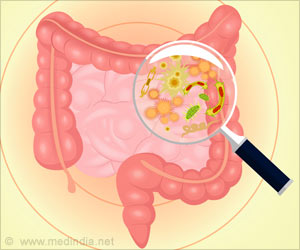Gut microbes metabolize tryptophan to serotonin which leads to sleep. In the microbiota-depleted mice, tryptophan was not metabolized which lead to abnormal sleep.

‘Gut microbes are important for the production of neurotransmitters like serotonin. Gut microbes metabolize tryptophan to serotonin which leads to sleep. In the microbiota-depleted mice, tryptophan was not metabolized which lead to abnormal sleep.’
Read More..




Microorganisms help in the digestion, which breaks food down into smaller pieces called metabolites. Significant differences between the metabolites were found in the microbiota-depleted mice and the control mice.Read More..
Professor Yanagisawa said, "We found more than 200 metabolite differences between mouse groups. About 60 normal metabolites were missing in the microbiota-depleted mice, and the others differed in the amount, some more and some less than in the control mice."
The next goal of the team was to determine the function of these metabolites. Using a method called metabolome set enrichment analysis, it was observed that the biological pathways which were affected by the antibiotic treatment were those involved in producing neurotransmitters. Neurotransmitters are molecules used by the nerves to communicate with each other.
The tryptophan-serotonin pathway, (produces serotonin that is important for well-being and mood) was shut and the microbiota-depleted mice had no serotonin but had high levels of tryptophan as they could not metabolize tryptophan to produce serotonin. Deficiency of vitamin B6 metabolites was also seen in these mice which accelerates the production of serotonin and dopamine.
Brain activity using EEG (Electroencephalogram) was used to analyze the sleeping pattern of the mice and it was observed that when compared to control mice, microbiota-depleted mice had more REM and non-REM sleep at night. Microbiota-depleted mice frequently switched between the sleep-wake stages than the control mice.
Advertisement
Professor Yanagisawa said, "We found that microbe depletion eliminated serotonin in the gut, and we know that serotonin levels in the brain can affect sleep/wake cycles. Thus, changing which microbes are in the gut by altering diet has the potential to help those who have trouble sleeping."
Advertisement















